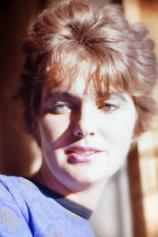Evening in Paradise: More Stories
Review
Evening in Paradise: More Stories
The publication of Lucia Berlin's posthumous short story collection, A MANUAL FOR CLEANING WOMEN, in 2015 happily introduced a writer mostly unknown outside the world of literary journals and small presses to a wider audience. Now, with EVENING IN PARADISE, we have a another, but no less satisfying, group of stories from someone New York Times critic Dwight Garner called "an important American writer," who "probably deserved a Pulitzer Prize," comparing her talent to that of short story masters like Raymond Carver and Denis Johnson.
Set mostly in the dusty desert Southwest and Mexico, with brief detours to Chile, New York City and Oakland, California --- all places where Berlin lived in her peripatetic life --- these 22 stories don't depart markedly, either thematically or stylistically, from those collected in the earlier volume. They also share with their predecessors a gaggle of characters, sketched swiftly but thoroughly and with wicked honesty, noteworthy for their failure to make much headway in their lives, while possessing sufficient self-awareness to alert them to the tragedy of their fate. They have a tantalizing sense that their lives could be better, yet they seem powerless to attain, or even establish, the goals that might bring them satisfaction.
"Berlin prefers character to plot, but on the handful of occasions when she concentrates simply on telling a good story, she displays the versatility of her talent... Berlin also possesses a gift for humor that helps soften the aridity of her characters' lives."
The typical Berlin protagonist is a young woman, often a mother, married or living with an artist or jazz musician (Berlin herself was married to two of them), drifting through her days on the edge of economic survival. That's true of Maya, a 19-year-old mother of two, in "The Adobe House with a Tin Roof." With her husband Paul, she moves into the eponymous house outside Albuquerque, a definite fixer upper that lacks electricity, among other essentials of modern life, and hires a man named Tony to install plumbing, a job that somehow never gets done. Like most of Berlin's stories, there is no neat ending. "She knew she'd never be back. She knew this wasn't a good marriage," Maya understands, as she and Paul pack up their belongings and leave for New York.
Berlin prefers character to plot, but on the handful of occasions when she concentrates simply on telling a good story, she displays the versatility of her talent. That's the case in "La Barca de la Ilusión," where a drug dealer named Victor, introduced in the collection's title story, returns to disrupt the idyllic life of one of his former customers and his family in a small beach town near Puerto Vallarta, with terrifying consequences. In "My Life is an Open Book," Claire entrusts her sons to the care of an irresponsible former lover, while she departs for a night of partying that ends the following morning with her in the bed of a new man. Her two-year-old son disappears during the evening, sparking a search of the hostile New Mexico countryside, before a deft ending that turns the story in a completely different direction.
For all the appropriateness of the comparison to writers like Carver, whether it's her description of the captivating beauty of the Sandia Mountains, with their "browns and greens and deep blues until at sunset they blazed pink, then magenta, melting into a velvety purple under a mauve sky," or some other striking setting, Berlin's evocative prose brings an energy to her stories that's often a welcome counterpoint to the foreground narrative.
"Days and months passed in an easy rocking rhythm. Just before dawn the roosters crowed and at the first light a thousand laughing gulls flew past the house upriver. Flocks of parrots flashed green dazzling against the cool gray coconuts. A different Nile, green iguanas sunned on the river rocks. Pigs grunted in the mud and horses from Chacala snorted on the trail. Spurs. The gentle surf whispered day and night and palms rustled with the same beat as the sea."
Berlin also possesses a gift for humor that helps soften the aridity of her characters' lives. That wit flashes in "Our Brother's Keeper," where the narrator, cleaning the apartment of her murdered friend Sara, imagines herself "a cleaning lady detective, sort of a female Columbo. Half-witted, gum-chewing…but while she's feather dusting she's really looking for clues," as she sifts through a mental catalog of suspects in the unsolved crime. "The Wives" features a wise-cracking alcohol- and marijuana-infused conversation between Laura and Decca, married at different times to the same man, who's now incarcerated in a Mexican jail as his current girlfriend flies there with the money to free him. Their bawdy shared recollections of disappointment and ennui are the essence of life in Berlin country.
For readers who still haven't had enough of Lucia Berlin, as a companion to this collection, her publisher has released WELCOME HOME, a brief, unfinished memoir. The undeniable autobiographical element in Berlin's fiction will make this rewarding reading.
It's hard not to feel at least a small twinge of regret at the thought of Berlin crafting finely tuned stories like these in obscurity while attention was lavished on better known literary contemporaries like John Cheever and John Updike as they dissected the lives of New York and New England suburbanites. But like one of her characters, one almost can picture Berlin accepting the acclaim that's come her way in recent years by lighting up a cigarette, pouring herself a cocktail and allowing herself a rueful smile.
Reviewed by Harvey Freedenberg on November 30, 2018
Evening in Paradise: More Stories
- Publication Date: November 5, 2019
- Genres: Fiction, Short Stories
- Paperback: 256 pages
- Publisher: Picador
- ISBN-10: 1250234867
- ISBN-13: 9781250234865




